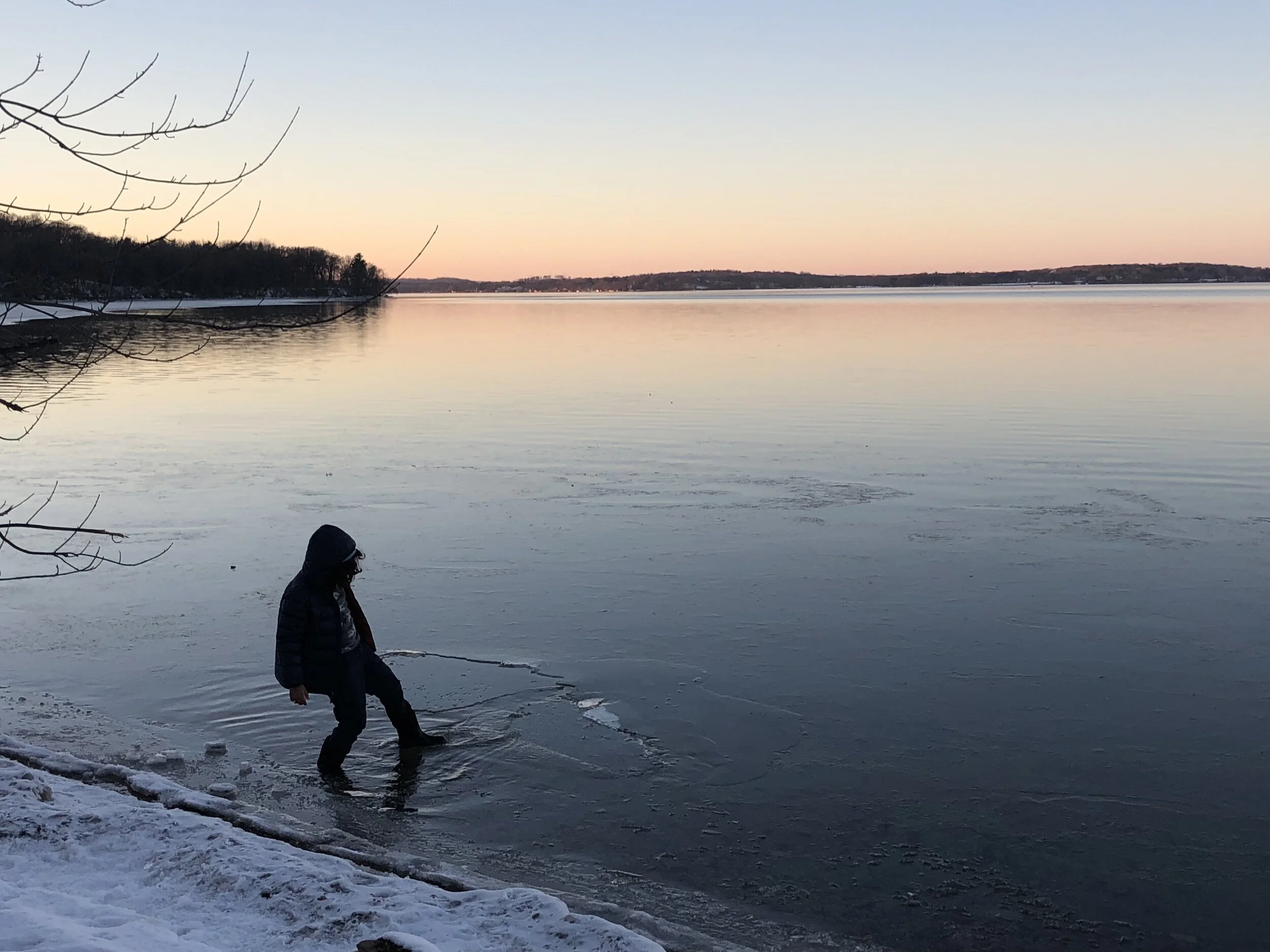Here’s how we collaborate
tadada Gots & Nots: A collaboration with students
Gots & Nots are a vital force of tadada. We leverage this collaborative technique to build community and empathy, to engage students’ creative voices, and to cultivate their active participation in shaping the course… and thus ownership.
collaborators: Geoscience 100 students, Stephen Meyers
Prof. Stephen Meyers and Geoscience 100 students, holding tadada Gots & Nots, in Agricultural Hall at the University of Wisconsin-Madison. (Photo by Ethan Parrish)
‘Gots’ from Geoscience 100 students, which articulate key concepts that they took away from the lectures.
Our Interconnected Story
In a world of remote learning, how do we forge meaningful connections? Our UW-Madison Geoscience 100 class of 485 students engaged in a collaborative project, sharing our own personal "Strings-of-Time" that document important moments in the history of our planet, and important moments in our own lives. "Our Interconnected Story" — the final lecture for Spring 2021 Geosci 100 — is the product of that collaboration, and it also tells the story of tadada Scientific Lab: what it is, how it came to be, and why. Join us as we roll out our Strings-of-Time and see how our journeys are interconnected!
The Deep Groove: A sonic journey into the Earth’s interior
This five-act tadada Connection Event for Introductory Geology (Geoscience 100) explores the science of seismology, earthquakes, and how waves tell us about the Earth’s interior.
collaborators: Ethan Parrish (film), Bravebird films, Mr. Chair (music), Rhea Ewing (art), Mike Meyers (tech), Lucas Zoet (geophysics), Neal Lord (geophysics), Stephen Meyers, Gigi Cohen, Teal Meyers
A montage from the tadada Scientific Lab production "The Deep Groove: A Sonic Journey into the Earth's Interior". Sound waves reveal information about the spaces that we inhabit - as they bounce and bend, probing our environment. Try closing your eyes and listening to these echos and reverberations. Can you infer something about these spaces - their sizes, what the walls are made of, etc.?
Beginnings
This four-act tadada Connection Event for Introductory Geology (Geoscience 100) explores the scientific concepts of beginnings, from the big bang, to the origin of our Solar System, and our planet. It includes a commissioned instrumental on the formation of our Solar System, Nebulebula, by the band Mr. Chair.
collaborators: Ethan Parrish (film), Mr. Chair (music), Buzz Kemper (narration), Mike Meyers (tech), Stephen Meyers, Gigi Cohen, Teal Meyers
A video short from the tadada Scientific Lab production "Beginnings".
Grace in Space: The Comic Book Exam
“Grace in Space,” follows Gracie, a fictional Geoscience 100 student on a transformative journey to discover her connection to our planet, its vast history, its changing climate and her role in deciding the planet’s future. The comic book exam emphasizes the key course concepts and their interconnections.
collaborators: Jake Cohen (creator/writer), Rhea Ewing (artist/editor), Pan Jun Rader (cover artist), Stephen Meyers, Gigi Cohen, Teal Meyers
Cover of 'Grace in Space', a tadada comic book exam for Geoscience 100.
The Print of Time
Artist and master printer Bruce Crownover joins us in teaching students how the creation of a reductive woodcut — one of the oldest forms of printmaking — relates to geologic processes. We explore how the masterpiece of Earth’s geological history is revealed through the accumulation of layers and the concept of deep time and how geoscience inspires his art. Watch the video on our YouTube channel.
collaborators: Bruce Crownover (art), Rob Griffen (flim/photography), Spencer Blesi (film/photography), Ethan Parrish (film), Mr. Chair (music), Stephen Meyers, Gigi Cohen, Teal Meyers
Stages of the reductive woodcut process, with Bruce Crownover.
Living in an Uncertain World
This special lecture was created by the tadada team to inspire hope and perspective — and decision making based on sound science and empathy — amidst the COVID-19 pandemic. The final Geoscience 100 lecture of the semester debuted (online) on April 30, 2020 at the University of Wisconsin-Madison.
collaborators: Spring 2020 Geoscience 100 class, UW-Madison Chancellor Rebecca Blank, Dwayne "The Rock" Johnson, Mr. Chair, Naomi Barshi, Andrew Jones, Ethan Parrish, Colby Schwaderer, Stephen Meyers, Gigi Cohen, Teal Meyers
The final lecture of the semester for "Geoscience 100: Introductory Geology", created by the tadada team during the COVID-19 pandemic and debuted (online) on April 30, 2020 at the University of Wisconsin-Madison.
founding collaborators (tadadaists)
Stephen Meyers
Gigi Cohen
collaborator/co-founder
photojournalist & social documentary photographer, artist
(photo: Yunghi Kim)
Teal Meyers
collaborator/inspiration
thinker, idea maker, adventurer, origami expert, scientist, musician, artist
(photo: Gigi Cohen)
collaborators (tadadaists)
in order of appearance
Violetta Villa
Jacob Cohen
Rhea Ewing
Mike Meyers
Rich Slaughter
Geoscience 100 Class of Spring 2018
Jason Kutz
Ethan Parrish
Mark Hetzler
Ben Ferris
Mike Koszewski
Buzz Kemper
Patrick Kuhl
Allison Hartman
Jacob Woodard
Andrew Walters
Bruce Crownover
Spencer Blesi
Rob Griffin
Nina Chaudry
Kelly Tyrrell
Vinita Srivastava
Alex Villa
Geoscience 100 Class of Spring 2019
Pan Jun Rader
Neal Lord
LUCAS Zoet
Alex Miranda
Noel Miranda
Rodney Lambright II
Marika Parrish
Alyssa O' Connor
Eric Sutter
unknown police officer
Shlomo HoniG
Collin RollanD
Nicholas Sullivan
Mike Gorski
Harry Browne
Bethany Jurewicz
Satoko Hayami
Lisa Caesar
Noah Robischon
Charlotte Šunde
Bruce Foster
Naomi Barshi
Andrew Jones
Colby Schwaderer
DwaYne “The Rock” Johnson
Chancellor Rebecca Blank
Geoscience 100 Class of Spring 2020
EMILY MIXON
Greg Ruetenik
Geoscience 100 Class of Spring 2021
Geoscience 100 Class of Spring 2022
Eneas Torres Andrade
Kaitlyn Crouch
Cam DeSilva
Sally Stevens
Geoscience 100 Class of Spring 2023
Noah BrowN
Evgeny Mazko
Miles Reed
ALISSA CHOI
Francisca Núñez Ferreira
collaborating organizations (tadada-orgs)
in chronological order
Weather Gauge Productions
The Wisconsin Academy of Sciences, Arts and Letters
A special thank you to Karl Scholz, Eric Wilcots, and Roberto Rivera
Initial support for tadada Scientific Lab was provided by a Vilas Distinguished Achievement Professorship from the University of Wisconsin-Madison








